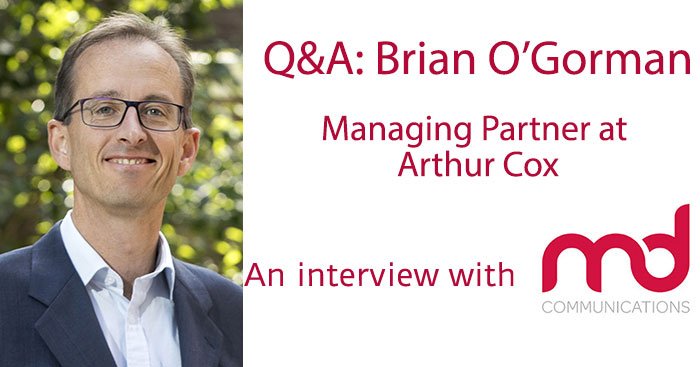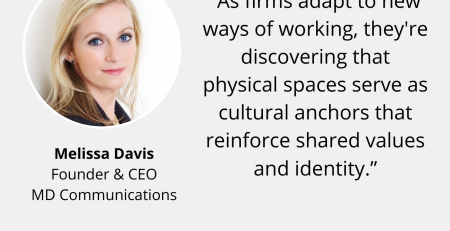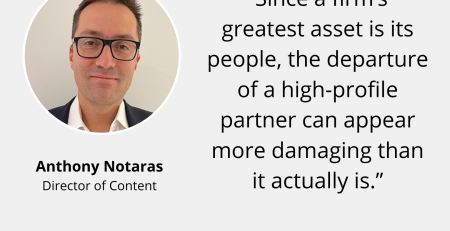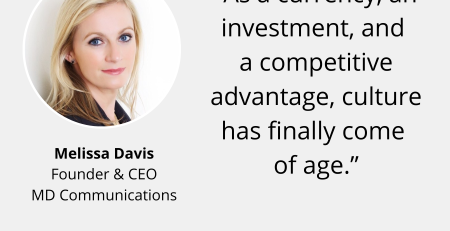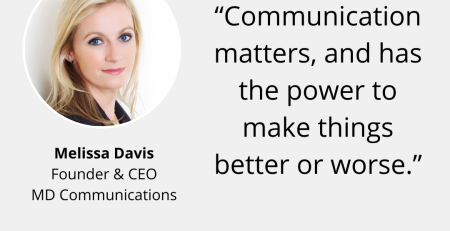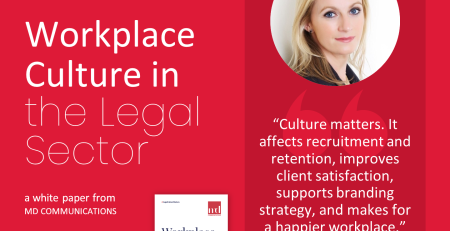Brexit is still dominating the headlines so it’s apt that our latest Thought Leader interview is with Brian O’Gorman, managing partner at Dublin-based law firm Arthur Cox. Brian shares his views on how Brexit will impact the legal sector and his firm and talks passionately about the need for firms to address equality and diversity.
On style of management and advice for aspiring leaders
It is very difficult for me to assess my management style; that’s really for others, not for me.
How I manage people
I have always tried to be fair and to put the best interests of the firm first in every decision I have made. I have tried to make the firm a better place for everybody and to engineer change – in particular in diversity and inclusion. We are a very ambitious firm, a very driven firm, but I think we manage to retain our humanity, our sense of humour and our perspective.
The Arthur Cox brand
We have been the leading firm in terms of Irish plc relationships for many decades now. The real change we have seen over the past ten to twenty years is the growth in the strength of our brand internationally, and in particular in the US and across Europe.
How have we gone about building our brand and reputation? Gimmicks don’t work, as the audience is very sophisticated and very demanding.
We try to simplify things. If you can build the best firm, the strongest partnership, the firm with the most depth and expertise, the major clients and mandates will follow, as will working with other leading law firms around the world. Through that brand and reputation is built.
Me and the law
I chose law because I thought it made for a good degree. Neither of my parents were lawyers and I hadn’t really considered it a calling as such. But I was attracted by a career that offered challenging, interesting work. I studied at Trinity College Dublin from 1986 to 1990 and decided to move abroad – at least for a while. Ireland wasn’t in a great place back then, either economically or more generally. A stint abroad seemed like a good idea.
I got a training contract at Slaughter and May in London. It was an incredible time. After moving around different groups at the firm as a trainee, I wanted to focus on corporate law. It was the era when M&A was very much in vogue. Michael Lewis had just published “Liar’s Poker”, and everybody seemed to want to be an investment banker or M&A lawyer.
The idea of doing international deals with major clients across the world was very appealing to me. The partners in the group included many leading M&A lawyers, such as Tim Clark (former senior partner), Michael Pescod and Steve Cooke (current senior partner).
Seeing Slaughter and May
Slaughters back then had this reputation for being stuffy, old-fashioned and made up of Oxbridge trainees, but that wasn’t my experience.
It was very diverse, open-minded and fun – and it was a meritocracy first and foremost. Everyone was charming, warm and inclusive. The idea of it being any other way always seemed a misconception to me. During my time there, I also did six months work experience in Hong Kong which is where I met my wife, a fellow Slaughters trainee. I have many reasons to be thankful to the firm.
Dublin
In terms of a legal career, Dublin certainly offers very high quality work and a good quality of life. While it is competitive, there are great opportunities for law graduates in Ireland. Of the roughly 400 solicitors that qualify every year, more than half of them are trainees within the top Irish firms. The top quartile of university graduates are likely to be inundated with offers of training contracts, not just from the top Irish firms, but often from the top UK firms too.
Mental health and wellbeing
This is something firms definitely need to do more on. I’m very conscious of the need to have a supportive work environment where staff can turn to us if they need to talk.
I’m kept informed if there are people in the office that have personal difficulties going on in their life, whether its suffering from illness or depression, or just struggling to manage. I have weekly meetings with HR to keep up to speed.
Equality and diversity
This is an issue I’m hugely passionate about. Firms should be doing more to drive diversity and eliminate institutional biases – you see it in this industry all the time.
Those subtle ways in which women are treated differently to men as lawyers. Whether it’s getting an invite to a client dinner, or client succession planning, or networking with peers – call it the patriarchy or white male privilege – but it exists. It’s very much incumbent upon men to lead and drive change.
Business and Brexit
The extent to which our domestic Irish clients will be impacted by Brexit varies enormously from sector to sector. While this may not have been the case a year ago, nobody is now underestimating the risk of a hard Brexit, and contingency plans are well advanced across the board.
There aren’t any quick fix solutions out there for businesses that export primarily to the UK, though everyone is doing what they can in terms of reducing reliance on UK exports, exploring alternative distribution and supply chains, and seeking new markets for their products.
Brexit and professional services
For us as a firm, not a great deal, if anything, will change. However, the competitive landscape in the legal sector in Ireland has been changing, and the acceleration in that change with ever more international entrants in the last year or two is surely not coincidental.
Undoubtedly, Brexit has pushed forward the internationalisation of the Irish legal market. It was happening already but Brexit undoubtedly gave it a nudge forward.
Business coming to Dublin
Predictions in terms of the amount of business that would move to Dublin varied wildly from commentator to commentator in the aftermath of the referendum in 2016.
I think it’s probably fair to say that Ireland has done well in terms of attracting international financial institutions to Ireland, although activity outside the financial services sector has perhaps been more muted than might have been expected.


